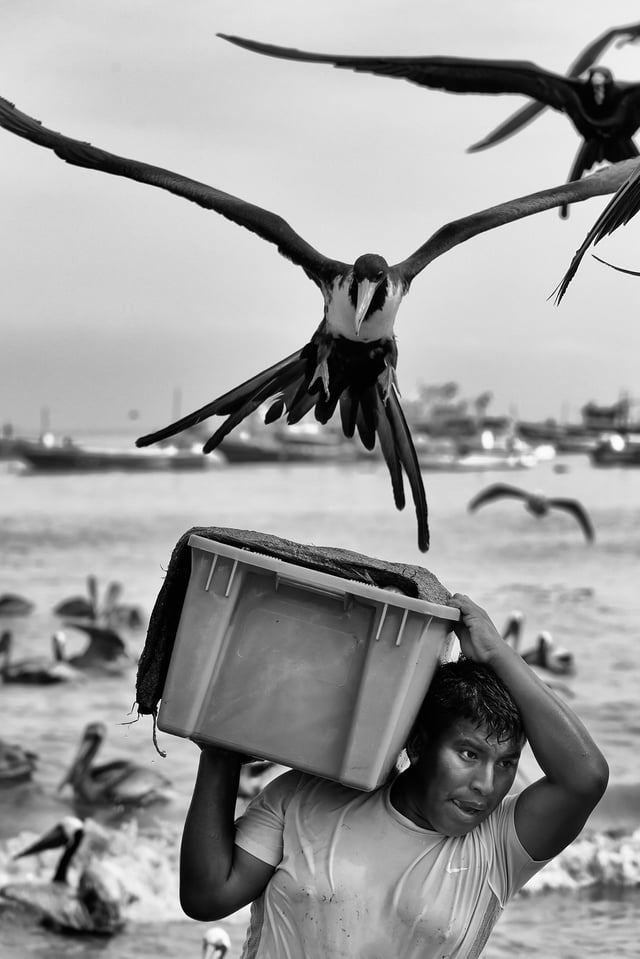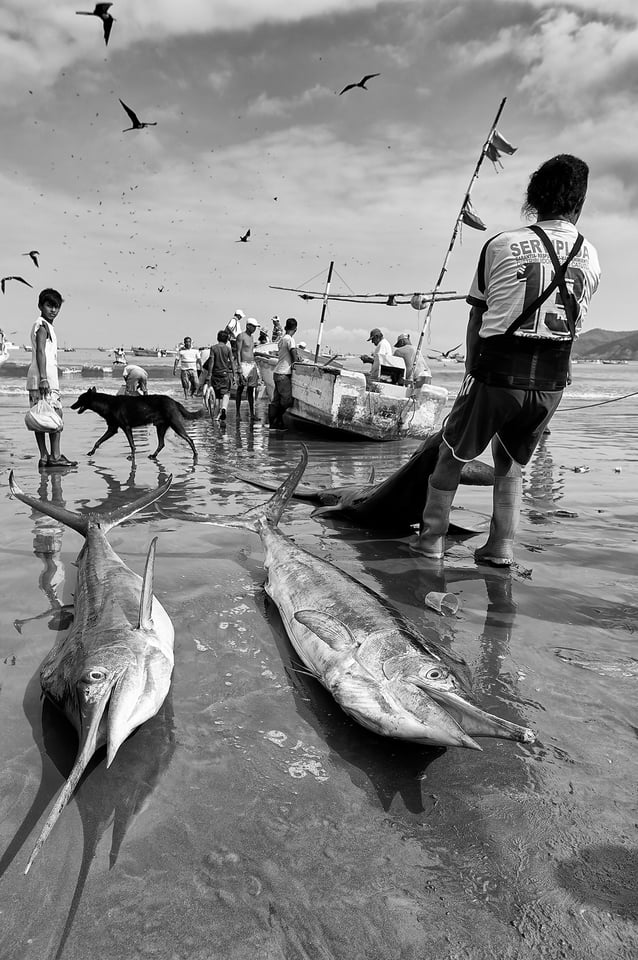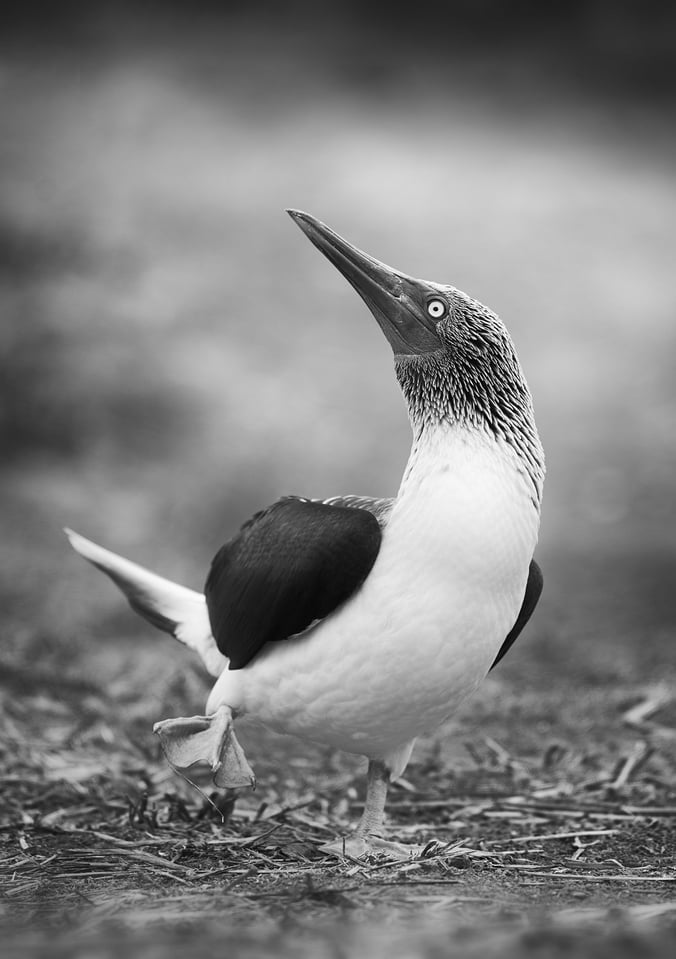What is the oldest profession in the world? Although the most common answer to that question is… well, a different source of livelihood, I’m not far from the truth when I say it’s fishing. We can find depictions of fishing on cave walls, as well as in the tombs of the ancient Egyptians.

One place where fishing remains the lifeblood of a community is the Ecuadorian village of Puerto López, located about a hundred miles south of the equator on the Pacific Ocean.
Every morning, for many years, the same scene has repeated itself in Puerto López. After a night of fishing, small boats return to the beach with their catch. Fishermen, bent under the weight of boxes of fish, rush to the beach. Hungry Frigatebirds and Pelicans await these protein-laden loads.
The great flocks of these feathered corsairs of the tropical oceans look like something out of an Alfred Hitchcock novel.

With wingspans of more than two meters, Frigatebirds are aerial acrobats who fearlessly steal fish right from the boxes on fishermen’s shoulders. Their silhouettes, with slender wings, resemble prehistoric monsters. Meanwhile, the Pelicans prefer to wait for what the fishermen drop into the water.
A bit further from the shore, Blue-Footed Boobies dive headlong into the waves to catch their prey. From June to October, the scene is enhanced by Humpback Whales, for whom these waters are the place to give birth to a new generation.

Nothing that the boats bring to the beach is wasted. Whatever falls out of the fishermen’s hands is immediately returned to the cycle of life and death.
Even commercially worthless bycatch, such as Moray eels, await the hungry stomachs of Black or Turkey Vultures. Much of the fish is processed and sold right on the beach. Some, however, continues on, and who knows – it might end up on your table.

Unfortunately, also on the local beach you can see how the number of fish in the ocean is shrinking and the catch is getting thinner. For larger fish such as Swordfish, it is necessary to go far out into the open ocean.
Still, the range of small fishing boats is quite limited and gives the fish a chance. If the entire world’s fishing industry were like this, the oceans everywhere would still be teeming with marine life. Unfortunately, where small boats can’t go, large fishing vessels venture – often using techniques that quickly empty the sea.
For now, though, there is enough sea life to support the age-old scenes that I’m showing you below. The question is, for how long?























Great work! Hopefully it will be promoted in an exhibition and/or a publication.
Excellent photojournalism!
Thank you very much, Eddie.
Overfishing is a harsh problem, and unfortunately, many people don’t have much awareness of what happens beneath the sea so it’s really great that you’re highlighting it. I do agree completely that if fishing were “less efficient” and more targeted then it would actually be much better for the ecosystem.
Awesome shots, Libor!
Thanks a lot Jason. It’s a sad fact that humans are very effective where they shouldn’t be and vice versa. Maybe one day we’ll reverse that and put our intelligence and efforts in the right direction. If it’s not too late…
Awesome images and they do tell a story. It does make me want to become a vegetation though.
I feel the same way. At least I try to limit the amount of meat on my plate.
Just curious about a few of the odd camera/lens pairings for some of the photos. I guess there wasn’t space to address anything about photography in the article, but I liked the photos.
I see you read carefully, Pat. Yes, some of the camera/lens combinations were indeed quite unusual. You’re probably referring to the combination of the Nikon D850 and the Tokina 11-16/2.8. This lens can cover the entire area of the full-frame sensor at 16mm, so I take advantage of that from time to time. Although, as you may have noticed, the quality in the corners is not great.
These are truly incredible photos. Amazing work, show worthy.
Thank you very much. I’ve been planning for a while to put these photos together and tell a meaningful story. I’m interested in this subject, and I can imagine expanding the story to include other aspects, such as the fishermen’s lives at home and at sea. Hopefully I’ll get a chance to finish it one day.
Lovely images! Thanks Libor
Thank you Peter, I’m so glad you liked it.
1. Magnificent frigatebirds are quite nasty and offensive in their behaviour. They steal other species’ food or just plainly eat their nestlings. I personally saw one trying to get a small booby from its nest but the mother bird chased him away. That was an interesting and dynamic scene to observe.
2. As for the overfishing – that is a problem everywhere. Unfortunately even places like Galapagos Islands are not resistant to that. While the locals are allowed to fish, just like they have for the past several centuries (with small boats, only for their own use or to sell small numbers on a local market), there is a problem e.g. with Chinese fishing vessels poaching in these rich waters (mainly for sharks) with no to little consequences. There have been talks in Ecuadorian government to expand the size of the reserve by significant number of nautical miles but that alsoequals more territory to scout and guard with the same limited resources. Poachers would not be scared away by mere law regulations.
The frigatebirds are really a kind of sea pirates. Their feeding strategies are not very honest from a human point of view. But they’re fascinating creatures. For example, it’s interesting that despite their considerable size, their skeletons are so light that their bones are lighter than their feathers. True rulers of the sky.
Regarding overfishing and poaching in general. You are right that laws that are unenforceable (or unenforced) are useless. Many countries where nature suffers actually have pretty strict laws on paper. And we don’t have to go far. We can just stay home.
I know what you are aiming at, and I definitely agree. But we were discussing the south Pacific waters, hence my comments.
A great story told there. thanks.
A similar story everywhere, overfishing by large trawler fleets causing dwindling fish resources everywhere for small fisherman like these in conjunction with ever growing impacts caused by climate change.
It’s true, Kevin, what’s going on around us doesn’t give us much reason for optimism. But there are stories with happier endings. Hope dies last.